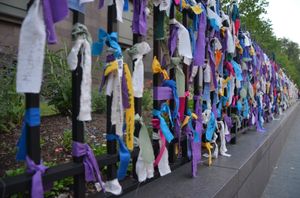It’s been a week since World Communion Sunday, and yet questions about the meaning of communion are still buzzing around my head. I was raised in a particularly secular humanist Unitarian Universalist Congregation. Ours was the church where the word “god” was never said, and people got really uncomfortable with phrases like “divine spirit” or “universal power”. Needless to say, communion, in the bread and wine sense, had never been apart of our religious practice. UUs have alternative rituals like water and flower communion, but I’ve never been to bread and wine communion at a UU congregation.
I walked into Marsh on World Communion Sunday not really knowing what to expect. I guess I had assumed that since it was “world communion” it might have been a little more theologically broad, but the message was very clear. The bread offered was supposed to be a reminder of Christ’s body and the wine was supposed to be a reminder of Christ’s blood; both of these also served as reminders for Christ’s love and sacrifice. In my tradition we tend to treat Jesus as a good man and teacher, but not the divine Son of God. In light of this belief, which I hold pretty central to my own faith, I felt really uncomfortable getting up for communion. I sat in the pew, wrestling with my own faith and basically freaking out. I felt kind of isolated because everyone else seemed happy to take communion, but I was really scared to. I left Marsh with a ton of questions about my faith and communion.
Later that week I had a really good conversation with Soren, which kind helped me work through my communion questions. I realized that my confusion stemmed from the concern that I was obligated to take communion since I work at Marsh. Even though, I feel really uncomfortable taking it as a Unitarian Universalist. I feared that if I took communion I would be breaking ties with my UU faith. After the conversation though, I realized that A. there was no obligation to ever take communion because of my work at Marsh, and more importantly B. that taking communion wouldn’t necessarily go against my UU faith. Soren helped me understand that as a UU I can find divinity and truth in the beliefs and rituals of many traditions. Therefore, I could participate in another traditions ritual, like communion, without feeling disingenuous to my own faith.
This discussion, and the continued thinking I have been doing about communion, has really helped put communion into prospective. I still don’t think I am ready to do it, I’m not sure I’ll ever be ready to do it, but talking about it has made me feel so much more comfortable with it as a practice. Since my conversation, I have had another situation where I was offered communion. This time, I felt comfortable asking for a blessing instead (which apparently is a valid alternative for those of us not as comfortable with communion). Slowly but surely I am navigating my way through being a UU in a setting where communion is an important part of worship.
